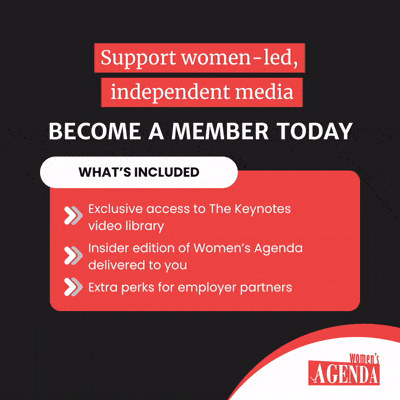As the famed Mad Men series approaches its final hours, the show has been getting a lot of attention. How will it end? What will become of the brilliant and dysfunctional Don Draper? What will we do without the weekly fix of 1970s gloss and glamour?
The show’s hotly anticipated ending has also meant an increased in advertising space, particularly on streaming giant Netflix, which recently landed in Australia.
There is one ad that the web platform runs regularly, that needs a little work.
The ad features a picture of Elizabeth Moss’s character, Peggy Olson, looking defiantly into the camera.
“Before feminism, there was Peggy,” the text reads.
Nope. Sorry. Wrong. Not even close.
Netflix, your history is failing you. But fear not, we’re here and willing to give you a crash-course. Consider it our civic duty.
Even at the time of Mad Men’s very first episode, in the 1950s, feminism had been around for over a good hundred years.
Feminism as an organised movement is began around the 1850s in England, the US and most of Europe. This 19th century movement – which we call first wave feminism, for the uninitiated – focused on gaining property rights for women, eliminating gender-based discrimination, and achieving the right to work. Another major focus of this movement was the demand for the right to vote, which was granted in the first instance in 1893, in New Zealand, and then spread across the world into the beginning of the 20th century.
The right to vote was a hugely significant battle for feminism – a battle that was fought and won half a century before Peggy Olson’s character was even born.
The momentum and power of the unstoppable women who won us the right to vote, the right to work and the right to own our own property was then taken up by a new generation of women beginning in the early 1960s. This second wave focused on equally important battles – the right to make decisions about our bodies, the right to workplace equality, and the right to freedom from discrimination, violence and fear.
This powerful movement of second wave feminism took the world by storm through the 1960s and 1970s, at precisely the time when Peggy Olson is making her imaginary-but-fabulous rise through Sterling Cooper’s ranks.
I love Peggy Olsen but the idea she was single-handedly smashing gender stereotypes in the 60s and 70s before ‘feminism’ became a thing is crazy. Her entire story is set in a time when women all across the world were fighting tooth and nail as a movement to eliminate the precise struggles that Peggy faces in the show.
I am not one of those women – I belong to the generation that inherited the fairer world they fought for – but to them, I imagine, the idea that feminism began after Peggy’s story would be pretty damn insulting.
I’m not saying that Peggy is not a feminist hero. She is. She begins as a softly-spoken, self-conscious secretary and sees her rise through the ranks off the back of her ambition and dedication to become a powerful, sassy copy chief and all-round stellar career woman.
It is a story that should – and does – inspire women everywhere. It is a story of success against all the odds. A story of broken barriers and smashed glass ceilings. I would never deny that. In fact, I have always argued that Mad Men is, at its core, a show solely about Peggy. It begins on her first day as a working woman. She is the catalyst for almost every plot point. It begins with her, and it will likely end with her. Hers is a story of progression against the backdrop of a cast of characters that are all devastatingly static. She is, to me, undoubtedly the heroine of this story.
But the truth is, without the sacrifices, commitment and unending dedication of feminists before her, Peggy Olson would have never stepped foot in that office in the first place. Without feminism, Peggy Olson’s story would never have even begun. And that’s why Netflix ought to change its ad. Before Peggy, there was feminism. And we’re all grateful for that.

